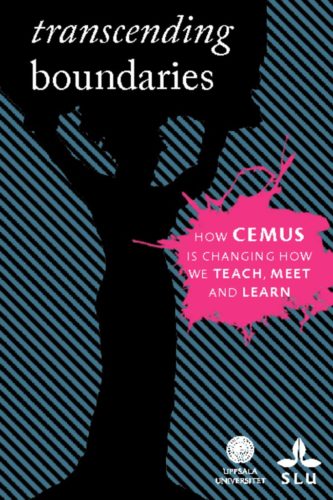PUBLICATION

Transcending Boundaries: How Cemus is changing how we teach, meet and learn
Compilation of articles and reflections on the unique student-led educational experiences from the Center for Environment and Development Studies (Cemus) at Uppsala University which was set up by and is still run by students. As one of the founders, Niclas Hällström, WhatNext? contributed with the chapter 'What is education for? – the History of Cemus'.More info/Summary
Cemus was formally launched in 1996, although the original efforts began already in 1990 when Niclas Hällström and Magnus Tuvendal took initiative to create an interdisciplinary course on global issues as the way to challenge the university to take more active responsibility and engagement on the planetary survival issues.
They were given responsibility to, as students, design the course and pull together an advisory group of senior researchers across all areas of academic disciplines, hence setting the stage for now 25 years of student initiated and student led education. The first course, ‘Humanity and Nature’ – soon gave rise to numerous other interdisciplinary courses, all conceived, planned and managed by students.
True to the original idea, an interdisciplinary centre to allow both a platform for the student-run courses, but also for students taking action on their insights, was set up. After initial planning by students through Cemus was launched as formal centre and de facto Univeristy department, jointly by Uppsala Univeristy and the Swedish University for Agricultural Science (SLU).
Over the years Cemus has steadily expanded its range of courses, which generally receives top scores in student evaluations. The centre is a vibrant community of students, supporting senior researchers, and one the last few years international guest professors through the Zennström Visiting Professorshop in Climate Change Leadership.
This book Transcending Boundaries provides insights on the first 15 years of Cemus unique journey as one of the few, if not only, student-led university department.
Since the book was published in 2011, Cemus thrives as ever before. More information on current activities and courses are found at www.cemus.uu.se.
Table of content
Preface – Carl Lindberg
Why a Translation? – Markus Nyström
A Book About Cemus – Matilda Hald
What Is Education For? – The History of Cemus – Niclas Hällström
See More With Cemus – A Student Perspective – Gustav Rydeman och Jonas Forsberg
Education for Sustainable Development is a Generational Issue
– In search of an educational model that will not destroy the planet – Jakob Grandin
Collaborating for Sustainable Development – The Cemus Forum and the Responsibility of the University to Inspire Change – Sara Andersson
Crossing Boundaries – An Analytical Look at Cemus’ Educational Model – Robert Österbergh och David O. Kronlid
Cemus’ Research School – Education, Freedom and Utility – Anders Öckerman
Internal and External Challenges Facing Cemus – Eva Friman, Matilda Hald, David O. Kronlid
Orthodoxies and Innovation in Academia – Ulrich Nitsch
Science and the Commitment to Change – Sverker Gustavsson
The Future of Cemus – Bengt Gustafsson

